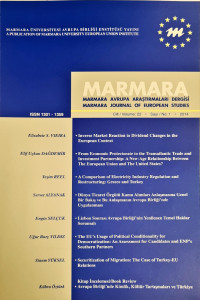THE EU’S USAGE OF POLITICAL CONDITIONALITY FOR DEMOCRATIZATION: AN ASSESSMENT FOR CANDIDATES AND ENP’S SOUTHERN PARTNERS
Abstract
This article, by applying the ratings of Freedom House, analyzes the effectiveness of the European Union’s usage of political conditionality for the democratization of the former and current candidate countries, and Southern partner countries in the European Neighborhood Policy. Political conditionality is the European Union’s main strategy to democratize candidate countries. Due to the effectiveness of European Union’s political conditionality all former candidates were labeled by Freedom House as liberal democracies before starting accession negotiations with the European Union. The European Union’s usage of political conditionality with current candidates has led to democratization of many practices, such as the protection of human rights, minority rights and different cultures. This success is mainly the result of the European Union’s membership incentive and, in case of non-compliance, the possibility of high domestic costs for candidates. The European Union has also used political conditionality to democratize its Southern partner countries through its European Neighborhood Policy. However, due to the lack of a membership incentive and domestic costs for these countries, political conditionality has not led to democratization, as clearly shown in Freedom House ratings for these countries since the introduction of the European Neighborhood Policy in 2004
References
- Stokke, O., (1995), Aid and Political Conditionality: Core Issues and State of the Art, Aid and Political Conditionality, Frank Cass, London.
- Yıldız, U. B., (2012), ‘The European Union and Democratic Consolidation in Turkey: The Impacts and Limits’, in Müge Aknur (Ed.), Democratic Consolidation in Turkey, Universal Publishers, Florida.
AB’NİN DEMOKRATİKLEŞME İÇİN SİYASİ KOŞULLULUĞU KULLANMASI: ADAYLAR VE AVRUPA KOMŞULUK POLİTİKASI’NIN GÜNEYLİ ORTAK ÜLKELERİ İÇİN BİR DEĞERLENDİRME
Abstract
This article, by applying the ratings of Freedom House, analyzes the effectiveness of the European Union’s usage of political conditionality for the democratization of the former and current candidate countries, and Southern partner countries in the European Neighborhood Policy. Political conditionality is the European Union’s main strategy to democratize candidate countries. Due to the effectiveness of European Union’s political conditionality all former candidates were labeled by Freedom House as liberal democracies before starting accession negotiations with the European Union. The European Union’s usage of political conditionality with current candidates has led to democratization of many practices, such as the protection of human rights, minority rights and different cultures. This success is mainly the result of the European Union’s membership incentive and, in case of non-compliance, the possibility of high domestic costs for candidates. The European Union has also used political conditionality to democratize its Southern partner countries through its European Neighborhood Policy. However, due to the lack of a membership incentive and domestic costs or these countries, political conditionality has not led to democratization, as clearly shown in Freedom House ratings for these countries since the introduction of the European Neighborhood Policy in 2004.
Keywords: Political Conditionality, Democratization, Candidate Countries, the European Neighborhood Policy, Southern Partner Countries
References
- Stokke, O., (1995), Aid and Political Conditionality: Core Issues and State of the Art, Aid and Political Conditionality, Frank Cass, London.
- Yıldız, U. B., (2012), ‘The European Union and Democratic Consolidation in Turkey: The Impacts and Limits’, in Müge Aknur (Ed.), Democratic Consolidation in Turkey, Universal Publishers, Florida.
Details
| Primary Language | English |
|---|---|
| Journal Section | Makaleler |
| Authors | |
| Publication Date | June 28, 2014 |
| Published in Issue | Year 2014 Volume: 22 Issue: 1 |


